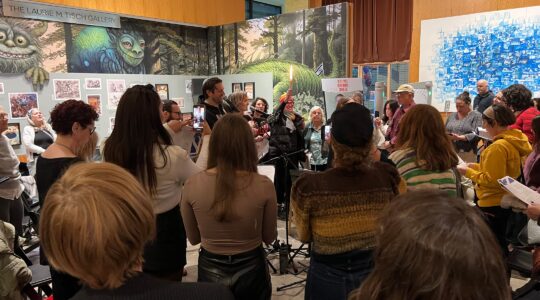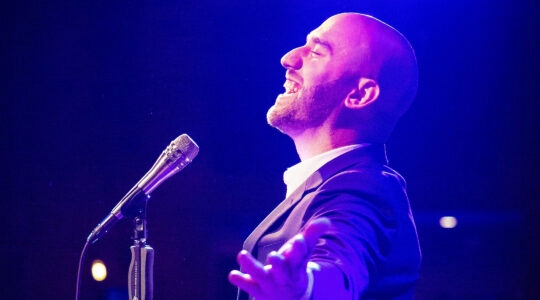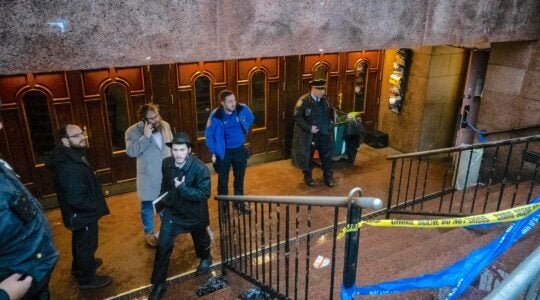Leaders of the Jewish Federations of North America are clearly hoping that what happens next week in Las Vegas won’t stay in Las Vegas.
The inaugural TribeFest at the Mandalay Bay Resort and Casino there from Sunday to Tuesday is intended as the ultimate “big-tent event,” drawing more than 1,100 unaffiliated or marginally affiliated Jews in their 20s, 30s and early 40s.
Participants were recruited through an extensive social media campaign as well as through a range of 40 organizations that have partnered with JFNA in the festival, which mixes entertainment with a range of forums on substantive topics.
The goal is similar to that of Birthright Israel, which whisks young Jews to another desert location to bring them closer to their roots and community and cultivate future young leaders.
But there will be no preaching.
“We had a very honest and open conversation with our partner organizations and told them we don’t need talking heads in the front of the room,” said Danielle Weinstein, director of JFNA’s development affinities programs. “This is an age group and a cohort that likes to be very engaged. … So we’re having as little lecturing as possible and as much interactivity as possible.”
The conference comes at a time when Jewish communal groups are increasingly seeking innovative strategies to cultivate the decision-makers of tomorrow, with federations funding unconventional projects like JDub Records and, in the past, Heeb magazine and philanthropists supporting Hebrew language charter schools and investing heavily in Birthright Israel.
Jewish organizations are also increasingly working to show young Jews that they can address universal concerns, like the environment and global poverty, not just parochial ones.
Sessions at TribeFest include forums on communal service, the environment, Israeli Arabs, inclusion of LGBT people and interfaith families, “Punk Jews,” or unconventional artists; ethical eating; President Barack Obama and the Jewish vote, a chance to meet Israeli soldiers and discuss criticism of the Jewish state from inside and outside the Jewish world.
There will also be a game-show style event, “Jewpardy,” a blood drive and musical performances by Y Love, Miri Ben-Ari, Soulico, Yemen Blues and Diwon.
Prominent participants include actress Mayim Bialik who starred in the ‘90s sitcom “Blossom” and appears on “The Big Bang Theory”; Ben Mezrich, author of “The Accidental Billionaires,” which inspired the film “The Social Network”; HBO’s “Real Sports” host Jon Frankel; NFL team presidents Mark Wilf of the Minnesota Vikings and Jonathan Kraft of the New England Patriots and Sonal Shah, head of the White House Domestic Policy Council’s Office of Social Innovation and Civic Participation.
Approximately 200 TribeFest registrants are alumni of Birthright Israel. Weinstein said that while TribeFest can’t mimic Birthright’s success without the captivating historic backdrop of the Holy Land, the two programs share “common goals and hopes for the next generation. For many it’s a life-altering experience and when they get back to their local communities they will ask ‘where does this leave me now?’”
Another difference is that Birthright Israel is completely subsidized by a partnership of communal funding sources, whereas TribeFest has a $475 registration fee in addition to hotel and airfare costs. Many local federations are subsidizing the registration fee for participants from their communities and in some cases travel and lodging costs as well. Some are even organizing car pools to Las Vegas.
In addition to Birthright Israel, the more than 40 sponsors and partners range from organizations with a global focus like the American Jewish Joint Distribution Committee and American Jewish World Service to Nefesh B’Nefesh, the aliyah advocacy group; the Jewish Book Council, the fraternity Alpha Epsilon Pi and JDate.
Esther Kustanowitz, a veteran of many young leadership initiatives like the ROI Community, and currently program coordinator of the NextGen Engagement Initiative at the Jewish Federation of Greater Los Angeles, sees TribeFest as inspired by a series of Washington conferences centered on activism sponsored by JFNA (formerly United Jewish Communities), focused on a similar population. But this time, the setting is more appealing and less formal.
“Part of the appeal of young leadership programs (events) is the ability to network both socially and professionally, and the fact that it’s in Las Vegas encourages that,” said Kustanowitz, a former Jewish Week columnist, who will be one of the presenters at a forum on career options in Jewish communal service. “Attendees are seeking opportunities to connect meaningfully to Jewish community and to communal leadership, but they also want to have a good time.”
The festival will also be chance to bridge some geographic gaps. Erin Kopelow, admissions director and marketing coordinator for the Sofaer International MBA Program at the Recanati School of Business Administration in Tel Aviv will not only conduct a workshop on leadership but will also take the opportunity to meet with a handful of applicants to her program next year.
“Usually we have to talk to our applicants through Skype to get to know them better,” said Kopelow in a call from Tel Aviv, where she lives. “This will be a chance to meet face to face.”
TribeFest is similar in nature, if not in scope, to the annual festival sponsored by the blog/online magazine Jewlicious, held for the past six years in Long Beach, Calif. This year’s festival was held Feb. 24 though 27. That event, which featured Shabbat programming, lectures, comedy, wine tasting and a concert by Matisyahu (via Skype, as it turned out), charged participants per event and offered an all-access pass for as little as $50.
Jewlicious is also a partner in TribeFest and will host what may be one of the more popular sessions there, “The Art of The L’chaim,” a “public toasting salon featuring discussion and tastings” of spirits.
JFNA spokesman Joe Berkofsky said a majority of TribeFest participants have had some kind of Jewish connection in their lives “but not as insiders. We want to widen the tent to get more people to really reach out and get more young Jews involved not only in federations but also in Jewish life generally, rather than preaching to the converted.
“We have to give young Jews a range of choices and entry points into the community and talk to them in a way that resonates.”
JFNA will conduct an extensive survey of participants to find out what worked and what didn’t for use in planning next year’s event.
Unlike the one-shot Birthright Israel, repeat attendance at Tribefest is welcome and encouraged.
“We would love to see people come back who want to explore more,” said Weinstein. “We don’t intend for the program to repeat itself. We want to give the people what they want.”
Rabbi Kenneth Brander of Yeshiva University’s Center for the Jewish Future, who won’t be at TribeFest, said he saw the event as a positive attempt at “future-building without addressing denominational issues. What they’re trying to do is create a first step and a portal through which we can engage in conversation.”
The rabbi said the effort was akin to addressing a hypothetical fifth son in addition to the four described in the Passover Hagaddah, who show varying levels of interest in the story of the Exodus.
“That’s the child that doesn’t come to the seder table,” he said.
The New York Jewish Week brings you the stories behind the headlines, keeping you connected to Jewish life in New York. Help sustain the reporting you trust by donating today.




